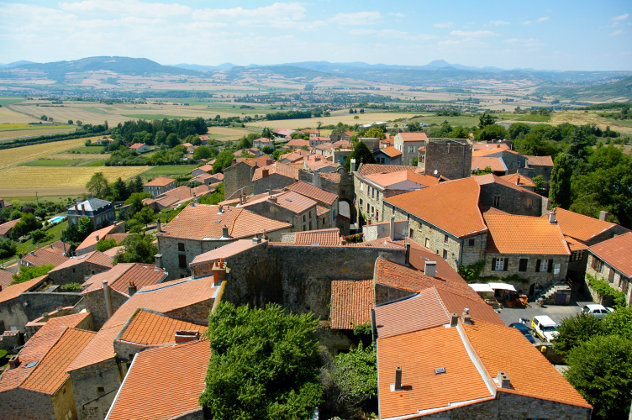France is a country of villages
Hans van der Kruijf, Thursday, 21 September 2017

France is a country of villages. Traditionally, the land has been inhabited by peasants and soldiers, who feel well at home in the villages. The villages are situated on sunny slopes or just shaded under high trees in a lovely valley. Villages where in summer the whole community jointly uses the meal at long white covered tables with singing and dancing after the event, and where in winter the neon lighting in the village street desires a "bonne fête" for everyone.
Village life occupies a prominent place in the existence of the French. Men and women experience a large part of the community life strictly separated. While the men meet in the café at a glass of pastis, the women see each other at the Boulanger or on the market.
For the men, hunting, fishing, cycling, football, rugby and the voluntary fire brigade (sapeurs-pompiers) are the binding factors. In a club context, the women are involved in organizing the major village festivals, making trips or attending courses. Each village does have a party room (sall de fête) for such activities.
The shops in the villages, such an important link in the social life of the villagers, are severely threatened by the encroaching center commercials in industrial areas outside the villages.
The church is another important meeting point in the village. Although many French people are not actively involved with the Catholic faith, the church habits still make up a significant part of village activities: Baptism, communion, marriage, burial and once a year the Christmas night mass.
There are four types of villages:
The municipality (village) with a relatively large village center. There are schools, shops, a post office, a bank and a few times every week market. Usually, also the Canton's capital, nowadays also the center of a Communauté.
A small village (commune) with at least one church, a pub, and a bakery, but without any other amenities. Sometimes there is a market.
A hamlet (lieu-dit) without church or pub, but a square with jeu de boules court. The baker comes every day with his van and the butcher 1x per week with his shopping cart.
A place (hameau) with a collection of houses and its town name. Often at the end of a narrow, dangerous road, hidden in a wooded valley or on a steep ridge.

France is a country of villages. Traditionally, the land has been inhabited by peasants and soldiers, who feel well at home in the villages. The villages are situated on sunny slopes or just shaded under high trees in a lovely valley. Villages where in summer the whole community jointly uses the meal at long white covered tables with singing and dancing after the event, and where in winter the neon lighting in the village street desires a "bonne fête" for everyone.
Village life occupies a prominent place in the existence of the French. Men and women experience a large part of the community life strictly separated. While the men meet in the café at a glass of pastis, the women see each other at the Boulanger or on the market.
For the men, hunting, fishing, cycling, football, rugby and the voluntary fire brigade (sapeurs-pompiers) are the binding factors. In a club context, the women are involved in organizing the major village festivals, making trips or attending courses. Each village does have a party room (sall de fête) for such activities.
The shops in the villages, such an important link in the social life of the villagers, are severely threatened by the encroaching center commercials in industrial areas outside the villages.
The church is another important meeting point in the village. Although many French people are not actively involved with the Catholic faith, the church habits still make up a significant part of village activities: Baptism, communion, marriage, burial and once a year the Christmas night mass.
There are four types of villages:
The municipality (village) with a relatively large village center. There are schools, shops, a post office, a bank and a few times every week market. Usually, also the Canton's capital, nowadays also the center of a Communauté.
A small village (commune) with at least one church, a pub, and a bakery, but without any other amenities. Sometimes there is a market.
A hamlet (lieu-dit) without church or pub, but a square with jeu de boules court. The baker comes every day with his van and the butcher 1x per week with his shopping cart.
A place (hameau) with a collection of houses and its town name. Often at the end of a narrow, dangerous road, hidden in a wooded valley or on a steep ridge.

Search for French property and real estate for sale in all regions of France. Fermettes, gites, houses, B&B’s for sale by owner. Houses for sale in Gironde, Dordogne, Landes, Calvados, Manche and Orne
 Everyone knows everyone, and everyone knows everything in the villages and small towns in France. At least, that's how it seems. Anyway, you can
sometimes find out a lot about the local housing market by talking to the locals. Hotels, chambres d'hôtes, cafés, restaurants, campsites are the best
places to do so because you can build short-term relationships here. By the way, local is entirely relative. The gossip area often extends for miles
around.
Everyone knows everyone, and everyone knows everything in the villages and small towns in France. At least, that's how it seems. Anyway, you can
sometimes find out a lot about the local housing market by talking to the locals. Hotels, chambres d'hôtes, cafés, restaurants, campsites are the best
places to do so because you can build short-term relationships here. By the way, local is entirely relative. The gossip area often extends for miles
around.